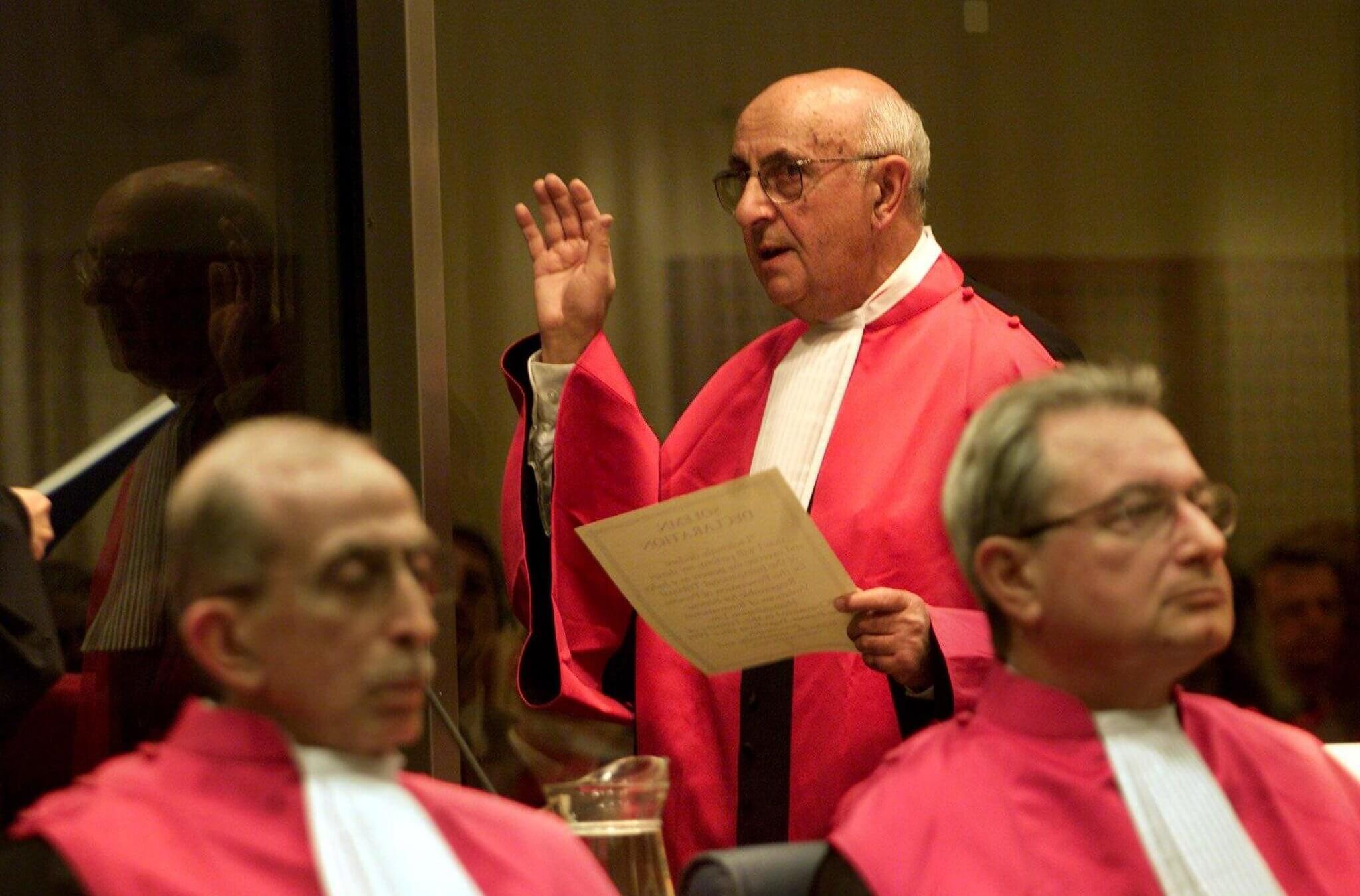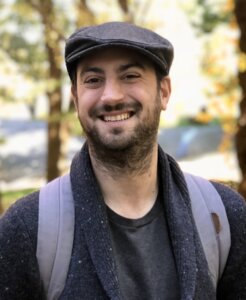This 94-year-old Holocaust survivor recommended arrest warrants for Israeli and Hamas leaders
Much has been said about Amal Clooney’s role on the ICC’s panel on war crimes, but less attention has been paid to Theodor Meron

American judge Theodor Meron is sworn in as a judge by the United Nations international war crimes tribunal in The Hague, 2001. Photo by Getty Images
By the age of 14, he had survived the Holocaust; by 44, he was an Israeli diplomat; now, at the age of 94, Theodor Meron recommended the International Criminal Court seek arrest warrants of Israeli and Hamas leaders for war crimes and crimes against humanity.
Meron, a New York University professor emeritus who has served as legal counsel for both the U.S. and Israeli governments, was one of eight legal and academic experts who were convened in January at the request of ICC prosecutor Karim Khan to review evidence of possible crimes during the ongoing Hamas-Israel conflict.
Based on the panel’s unanimous findings, Khan decided that he would seek charges against Israeli Prime Minister Benjamin Netanyahu and Defense Minister Yoav Gallant, along with three Hamas leaders, including Yehiya Sinwar. Khan’s announcement on Monday caused an uproar.
President Biden called it “outrageous,” and Netanyahu has named Khan as one of the “great antisemites in modern times.” The support for the arrest warrant of Amal Clooney, a human rights lawyer and George Clooney’s spouse, has received much attention; that of Meron, the only panel member to have served in the Israeli military, has barely been noted.
Meron was born in 1930 into a middle-class Jewish family in Kalisz, Poland.
“By the age of 9, I was out of school,” he said in a 2008 speech for the American Council of Learned Societies. “Ghettos and work camps followed, with most of my family falling victim to the Holocaust.”
After the war, Meron emigrated to Israel, where he finished high school. He did his military service before studying law at the University of Jerusalem, Harvard University and Cambridge University.
“The imprint of the war made me particularly interested in working in areas which could contribute to making atrocities impossible and eliminating the horrible chaos, the helplessness, and the loss of autonomy which I remembered so well,” he said in the 2008 speech.
In Israel, Meron climbed the foreign service ranks, and eventually, in 1971, he became Israel’s ambassador to Canada. In 1977, he began teaching international law at New York University. His family moved to New York, and he became a U.S. citizen the following year.
As a lawyer and judge, Meron gained a reputation for a clear-eyed reading of international law regardless of political pressure. In 2012, as president of the International Criminal Tribunal for the former Yugoslavia, he oversaw the unpopular overturning of convictions of Serbian and Croatian commanders.
In 2006, it was revealed that after the 1967 War, as legal adviser for the Israel Ministry of Foreign Affairs, Meron issued a secret memo that the construction of Israeli settlements in the West Bank or other territories Israel had captured was illegal under international law. In 1968, he declared in another secret legal memo that the demolition of Arab houses would be considered a form of unlawful collective punishment
His opinions were largely ignored by Israeli governments and prime ministers of both the Labor and Likud parties, who all oversaw the building of settlements in the West Bank; Netanyahu has also increased house demolitions as a form of punishment.
Meron, who spent two decades as a judge in U.N. crime tribunals for the former Yugoslavia and Rwanda, has been involved with the court in The Hague for decades. Since 2022, he has served as a pro-bono special adviser to the court, and in 1998, he was part of the U.S. delegation to Rome that led to the establishment of the ICC. Neither the United States nor Israel has ratified the statute that set up the court.
“The attacks by Hamas in Israel on October 7 and the military response by Israeli forces in Gaza have tested the system of international law to its limits,” Meron and other members of the panel wrote in a May 20 op-ed published in the Financial Times. “This is why, as international lawyers, we felt compelled to assist,”
The panel found “reasonable grounds” that the Hamas leaders had committed war crimes and crimes against humanity by killing hundreds of civilians, taking 245 hostages and committing acts of sexual violence against the hostages. It also found reasonable grounds that Israel had committed war crimes, including “intentionally using starvation of civilians as a method of warfare.”
Netanyahu denounced Khan, the ICC prosecutor, for creating “a false moral equivalency between the leaders of Israel and the henchmen of Hamas.” He compared him to judges in Nazi Germany who denied Jews basic rights and accused him of “callously pouring gasoline on the fires of antisemitism that are raging around the world.” The prime minister did not mention Meron.
In the Financial Times piece, the panel members emphasized that they focused on how the war is waged, not why or by who. “It is important to understand that the charges have nothing to do with the reasons for the conflict,” they wrote.
But for Meron, the context might be hard to ignore. He was in Israel for its birth in 1948 and was working for Israel’s permanent mission to the United Nations in New York when the 1967 War started. “The future and the survival of Israel were very much at stake,” he said in his 2008 speech.
It was directly after the war that he became the legal adviser for Israel’s Foreign Ministry and gave vital, but unheeded, advice regarding its actions in the newly seized territories.
In a 2017 editorial comment in the American Journal of International Law, Meron reflected on his legal opinions 60 years later. Not only did he still believe that the settlements and housing demolitions were illegal under the Geneva Conventions, but he found the settlements, in particular, to be a grave mistake for both Israelis and Palestinians
“Disrespect for international law is, alas, not unusual in the affairs of states,” he wrote. “It is rare, however, that disrespect of an international convention would have such a direct impact on the elimination of any realistic prospects for reconciliation, not to mention peace.”















